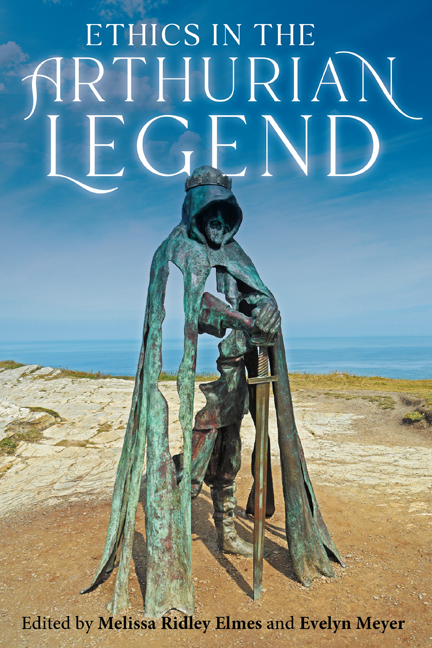Book contents
- Frontmatter
- Contents
- List of Contributors
- Foreword
- Acknowledgments
- Introduction
- 1 Arthurian Ethics before the Pentecostal Oath: In Search of Ethical Origins in Culhwch and Olwen
- 2 Too Quickly or Not Quickly Enough, Too Rash and Too Harshly: The Arthurian Court’s Lack of Ethics in Hartmann von Aue’s Erec and Iwein and Wolfram von Eschenbach’s Parzival
- 3 The Ethics of Arthurian Marriage: Husband vs Wife in Hartmann von Aue’s Iwein
- 4 Arthurian Ethics and Ethical Reading in the Perlesvaus
- 5 Translation Praxis and the Ethical Value of Chivalry in the Caligula Brut
- 6 Imperial Ambitions and the Ethics of Power: Gender, Race, and the Riddarasögur
- 7 Lowland Ethics in the Arthur of the Dutch
- 8 Contesting Royal Power: The Ethics of Good Lordship, Sir Gawain and the Green Knight, and the March of Wales
- 9 “As egir as any lyoun”: The Ethics of Knight-Horse Relationships in Lybeaus Desconus
- 10 Malory’s Ethical Dinadan: Moderate Masculinity in a Crisis of Hypermasculine Chivalry
- 11 Virtus, Vertues, and Gender: Cultivating a Chivalric Habitus in Thomas Malory’s Tale of Sir Gareth
- 12 Kingly Disguise and (Im)Perception in Three Fifteenth- Century English Romances
- 13 “Adventure? What is That?” Arthurian Ethics in/and the Games We Play
- 14 The Ethics of a New Edition of Sir Thomas Malory’s Le Morte Darthur – and More Evidence for the Superiority of the Winchester Manuscript
- 15 The Ethics of Writing Guinevere in Modern Historical Fiction
- Afterword
- Index
4 - Arthurian Ethics and Ethical Reading in the Perlesvaus
Published online by Cambridge University Press: 10 January 2024
- Frontmatter
- Contents
- List of Contributors
- Foreword
- Acknowledgments
- Introduction
- 1 Arthurian Ethics before the Pentecostal Oath: In Search of Ethical Origins in Culhwch and Olwen
- 2 Too Quickly or Not Quickly Enough, Too Rash and Too Harshly: The Arthurian Court’s Lack of Ethics in Hartmann von Aue’s Erec and Iwein and Wolfram von Eschenbach’s Parzival
- 3 The Ethics of Arthurian Marriage: Husband vs Wife in Hartmann von Aue’s Iwein
- 4 Arthurian Ethics and Ethical Reading in the Perlesvaus
- 5 Translation Praxis and the Ethical Value of Chivalry in the Caligula Brut
- 6 Imperial Ambitions and the Ethics of Power: Gender, Race, and the Riddarasögur
- 7 Lowland Ethics in the Arthur of the Dutch
- 8 Contesting Royal Power: The Ethics of Good Lordship, Sir Gawain and the Green Knight, and the March of Wales
- 9 “As egir as any lyoun”: The Ethics of Knight-Horse Relationships in Lybeaus Desconus
- 10 Malory’s Ethical Dinadan: Moderate Masculinity in a Crisis of Hypermasculine Chivalry
- 11 Virtus, Vertues, and Gender: Cultivating a Chivalric Habitus in Thomas Malory’s Tale of Sir Gareth
- 12 Kingly Disguise and (Im)Perception in Three Fifteenth- Century English Romances
- 13 “Adventure? What is That?” Arthurian Ethics in/and the Games We Play
- 14 The Ethics of a New Edition of Sir Thomas Malory’s Le Morte Darthur – and More Evidence for the Superiority of the Winchester Manuscript
- 15 The Ethics of Writing Guinevere in Modern Historical Fiction
- Afterword
- Index
Summary
I will not cease from Mental Fight,
Nor shall my Sword sleep in my hand:
Till we have built Jerusalem,
In Englands green & pleasant Land.
The thirteenth-century prose romance and Grail Quest, the Perlesvaus, also known as the Li hauz livres du Graal (High Book of the Grail), offers a version of Arthurian chivalry wherein the Quest is for more than the Grail. Romance becomes a vehicle for imagining the Arthurian conquest of Britain, a crusade-like mission to conquer and to convert. In this chapter, I aim to clarify the ethical position that we, as readers, ought to take, as well as to examine the ethics proper to the Perlesvaus. The ethical practice of engaging with a romance as violent, bloodthirsty, and heavyhanded as this one involves understanding this romance as part of a broader arc in the development of the genre. Rather than positioning the Perlesvaus as an outlier or anomaly, we must read it as a response to its contemporaries, both romance and chronicle. If we can shed the generic norms and assumptions developed in the nineteenth and twentieth centuries, which linger in our definitions and framing of romance, we can read romance for what it says and does instead of what we want it to say and do. And thus we can examine the ethics of this romance, which makes claims for its content to be on par with Holy Scripture while asserting itself as the full account of Perlesvaus, a holier Perceval. The conquest of territory that we know from Chrétien de Troyes's Conte du Graal is paired with a holy crusade to convert or slaughter all “pagans,” signaling a triumph of the New Law (Christianity) over the Old Law (an ambiguous blend of paganism and Judaism). In engaging with this text seriously, we must acknowledge that the use of Arthurian figures to justify religious violence and fanaticism is less of an anomaly than we might like it to be. This romance has long been maligned, and thus I argue that we read it for what it can tell us about the Grail quest rather than dismiss it for its ethical framing of the Quest as a crusade. As Jane Gilbert notes in her work on Arthurian ethics, “Arthurian chivalry always lies in a past discontinuous from the present or in some fantastical otherwhere, and is contemplated at a distance by a consciously ‘modern’ commentator.”
- Type
- Chapter
- Information
- Ethics in the Arthurian Legend , pp. 85 - 108Publisher: Boydell & BrewerPrint publication year: 2023



